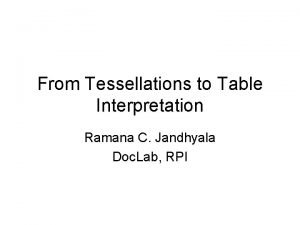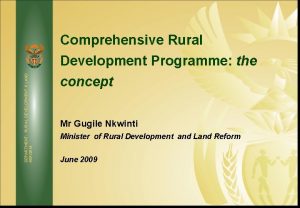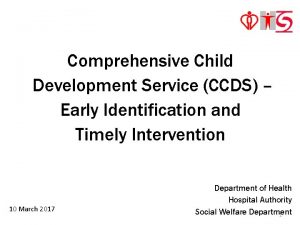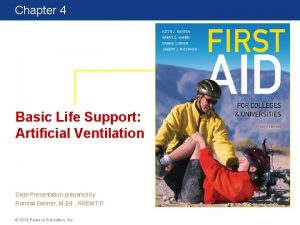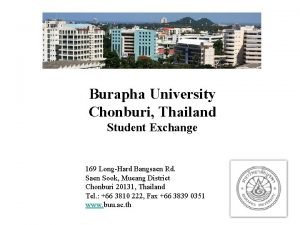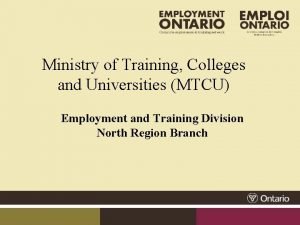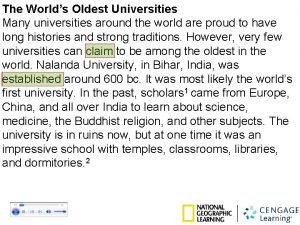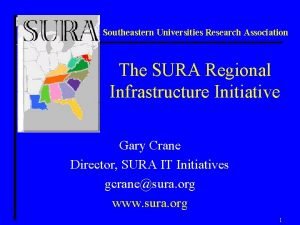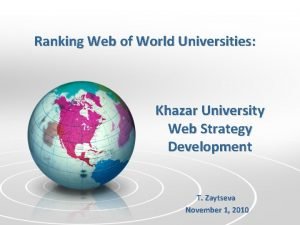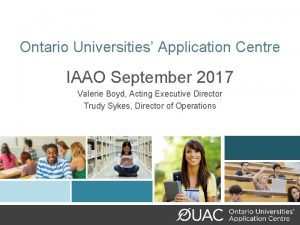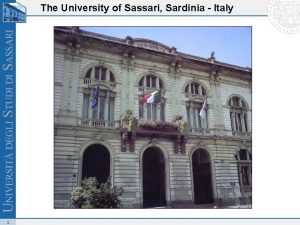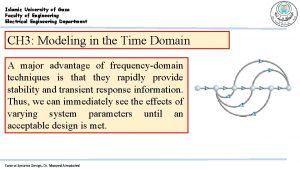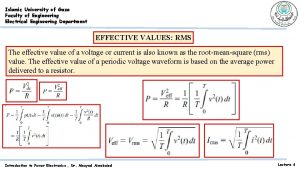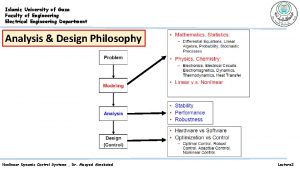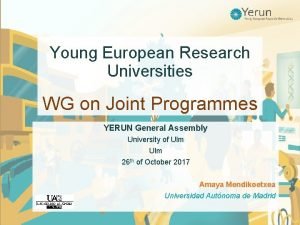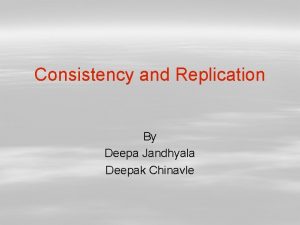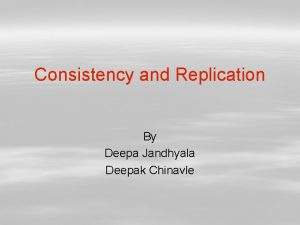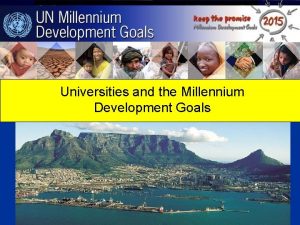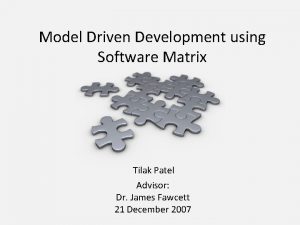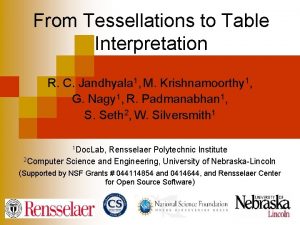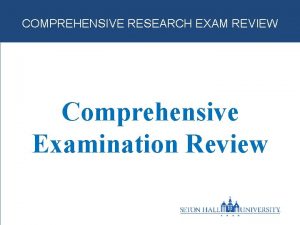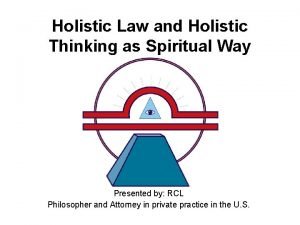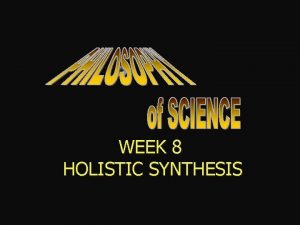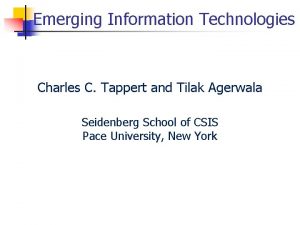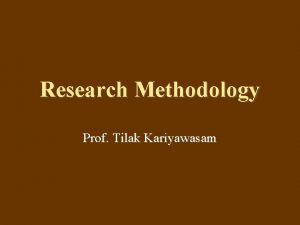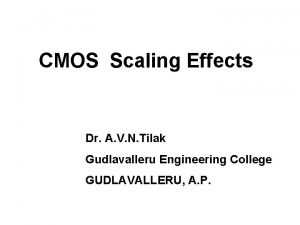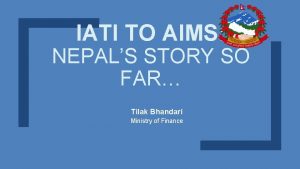Comprehensive Universities and Holistic Development Jandhyala Tilak National



























- Slides: 27

Comprehensive Universities and Holistic Development Jandhyala Tilak National University of Educational Planning and Administration, New Delhi E-mail: jtilak@nuepa. org

What is a University? “A university is a place where new ideas germinate, strike roots and grow tall and sturdy. It is a unique space, which covers the entire universe of knowledge. It is a place where creative minds converge, interact with each other and construct visions of new realities. Established notions of truth are challenged in the pursuit of knowledge” (Government of India 2009, p. 9).

Changing Nature of Universities • Five Generations of Universities

Five Generations of Universities • 1 st Generation: Ancient Period BC/early AD (upto 10 th c) • 2 nd Generation: Medieval Period 11 -18 th c. • 3 rd Generation: 1800 -Mid 20 th c. • 4 th Generation: 2 nd half of 20 th c. • 5 th Generation: 20 -21 st c.

First Generation Universities • Taxila in India (7 th c BC ; Nalanda in India (4 th c BC); Academy in Athens of Plato (4 th c BC) Focus • Pursuit of truth and knowledge • Dissemination of knowledge

First Generation Universities • Universal • • knowledge, universal values Religious, secular, Sciences, Maths, physics, philosophy… • Scholars • Indian and foreign (Korea, Japan, China, Tibet, Indonesia, Turkey, Persia (Nalanda and Taxila)

Second Generation Universities • Medieval • • • Universities (12 -18 th c) Bologna 1158 Oxford, University of Paris 1200 Cambridge, Arezzo, Palencia, Padua, Napoli (13 th c)

Second Generation Universities • Defend truth • ‘protection of the wisdom of the past’ • Teaching universal knowledge University “is a place of teaching universal knowledge … its object is intellectual. . and diffusion of extension of knowledge rather than the advancement” (John Henry Newman)

Third Generation Universities Humboldt university 1810 – mid 20 th c. • Teaching • Advancement of knowledge: Research • Specialization • Extension Activities

Third Generation Universities

Fourth Generation Universities (20 th c) : 7 -pointed stars • Community service/Extension = exploitation of knowledge for economic gains • Internationally competitive market • A know-how carousel • Trans-disciplinary research • 2 -tract universitt 6 y: fee/scholarships • Cosmopolitan • Privately funded; financial management Wissema (2009)

Fourth Generation Universities • Education, Research, Exploitation of Knowledge of economic gains • E. g. , Cambridge, Stanford, MIT • Scientific discoveries → commercial products • Market relevant research • Entrepreneurial activities

Fourth Generation Universities (20 th c. ) • Intellectual philanthropy replaced by intellectual property rights • Adoption of corporate values • Business management methods • Student fee • Socially exclusive • Serve the global capital markets

Fifth Generation Universities • 20 th century/21 st c. • Commercial institutions • Profit seeking institutions • More teaching and less research • Less expensive and more marketable education programmes • Totally student funded

Fifth Generation Universities • ‘Quick/Immediate returns research’ as against ‘delayed returns research’ (Andre Beteille) • Single faculty institutions • ‘Fragmentation’/’cubicalisation’ of knowledge (Yashpal) • Lack of diversity

Emerging Trends in Higher Education Conventional System Emerging System (4 -5 th (First 3 generations of universities) Higher Education as a private public good Welfare Approach Market Approach Public Higher Education Mixed and Private Higher Education Nature of Univs: Diversity Exclusiveness

Emerging Trends Conventional System Emerging System Public Financing State-Financed Institutions No Fees Low Levels of Fees No Student Loans or Govt-subsidised loans Philanthropy and educational Considerations Academic Institutions Increasingly private financed Student-Financed institutions Introduction of Fees High Levels of Fees Extensive reliance on commercially viable least-subsidised student loan programmes commercial motives; profit motives Entrepreneurial and commercial universities

Universities in ‘Trishanku’ “The universities of the world have entered an age of endless turmoil. National systems of higher education cannot count of returning to an old stage of steady state, nor of achieving new stage of equilibrium. ” Burton Clark (1997)

India: Diversity in higher education • Central, state, deemed, private, and ‘forprofit’ (? ) universities • Regular/full-time, open • Women’s universities and those only for men (!) • Language universities, technological universities, Medical universities • minority universities

How to rejuvenate the University ? • Past is not past/ not utopian • Recognise the contribution of higher education • Public good nature of education • Role of the State • Public university system, Less reliance on private sector

How to rejuvenate the University ? • Comprehensive universities for Harmonisation/ integration of knowledge • Defragmentation, de-cubicalisation • • • Teaching and research UG + PG + Research Add: extension • Multi-disciplinary • • : comprehensive Unthinkable to have a university without humanities, philosophy, history, languages, culture as major subjects IITs need to be made into full comprehensive universities

Expansion, Equity and Excellence [the 3 Qs or The Elusive Δ of the 3 Q’s (JP Naik) Quantity All the three are inter -related Quality Equity The goal should equitable expansion of quality higher education

Balanced Development of Education • Disciplines • Levels

The 3 Quadrants of the Education Pyramid Higher All the three are inter -dependent Primary Secondary The quality at one level depends upon the quality at other level

Five Basic Needs • Liberal • Funding from public and private sources Research, teaching and extension • Autonomy: Academic, Administrative, Financial • High quality teachers • Intellectual environment (library, labs, infrastructure) • Scholarships to promote merit and equity

Excellence in Higher Education: Holistic Development • Graduates: • • • Critical thinkers, visionaries Skilled manpower High quality researchers • Academic: Thirst for knowledge, respect for education • Vedic/Confucian values • National wealth • Social development • Human values • Social democracy • Create a humane society

Thank You
 Sampradaya tilak
Sampradaya tilak Aksharaa jandhyala
Aksharaa jandhyala Types of comprehensive od interventions
Types of comprehensive od interventions Comprehensive rural development programme
Comprehensive rural development programme Comprehensive child development service
Comprehensive child development service Lokmanya orthopedic hospital pune
Lokmanya orthopedic hospital pune Raag tilak kamod
Raag tilak kamod Tilak pasala
Tilak pasala Pearson
Pearson Fh
Fh Ufa state petroleum technical university
Ufa state petroleum technical university Chelyabinsk colleges and universities
Chelyabinsk colleges and universities Chon buri colleges and universities
Chon buri colleges and universities Yaroslavl colleges and universities
Yaroslavl colleges and universities Who's who among american college students
Who's who among american college students Mtcu sudbury hours
Mtcu sudbury hours Viaduct antonym
Viaduct antonym Southeastern universities research association
Southeastern universities research association Khazar
Khazar Universities that offer pharmacy in nigeria
Universities that offer pharmacy in nigeria Universities that accept ged in pakistan
Universities that accept ged in pakistan Ontario universities' application centre founded
Ontario universities' application centre founded University of sassari
University of sassari Should universities departments engineering
Should universities departments engineering Should universities departments engineering
Should universities departments engineering Should universities departments engineering
Should universities departments engineering Onet thailand
Onet thailand Yerun universities
Yerun universities

